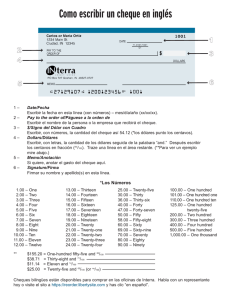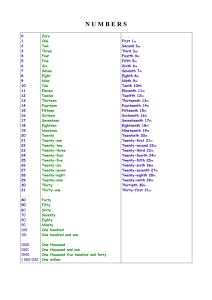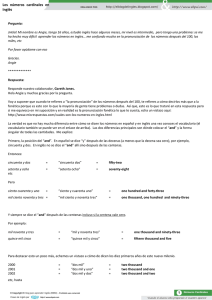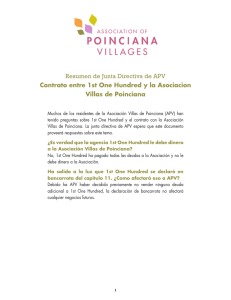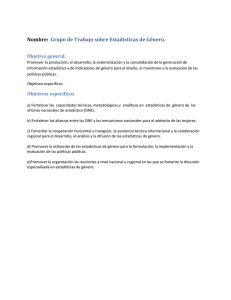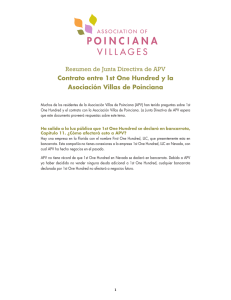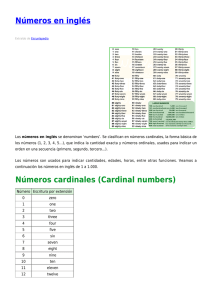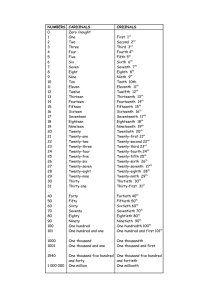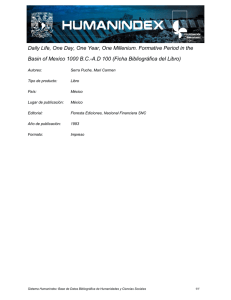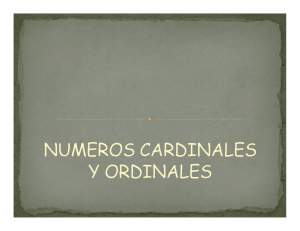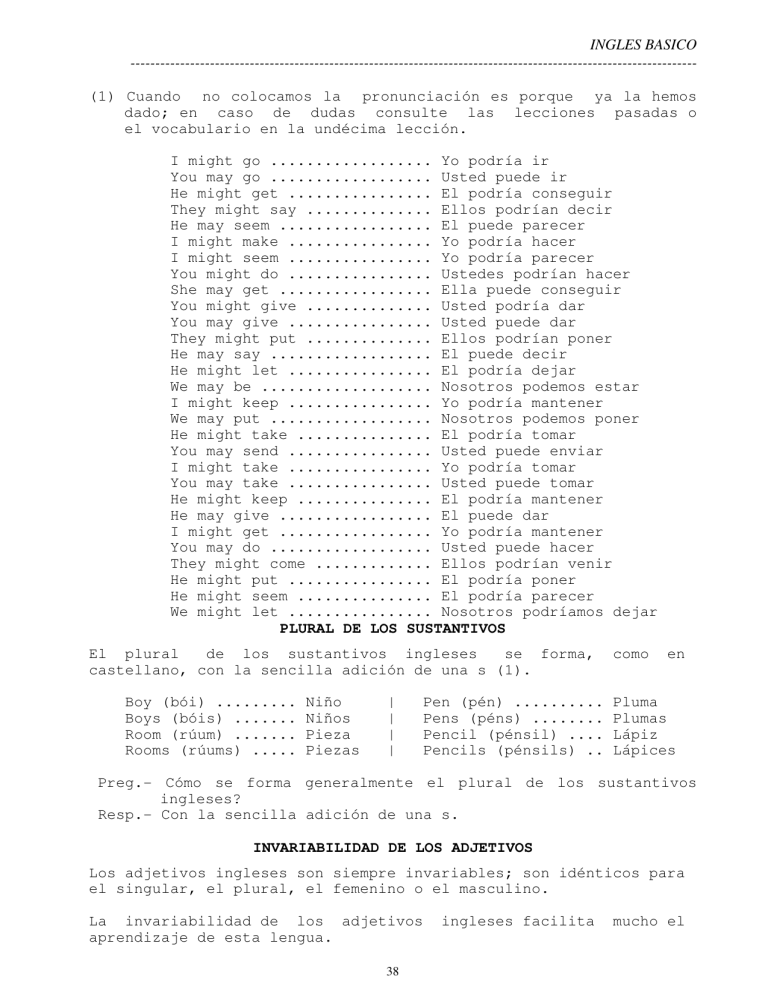
INGLES BASICO -----------------------------------------------------------------------------------------------------------------(1) Cuando no colocamos la pronunciación es porque ya la hemos dado; en caso de dudas consulte las lecciones pasadas o el vocabulario en la undécima lección. I might go .................. Yo podría ir You may go .................. Usted puede ir He might get ................ El podría conseguir They might say .............. Ellos podrían decir He may seem ................. El puede parecer I might make ................ Yo podría hacer I might seem ................ Yo podría parecer You might do ................ Ustedes podrían hacer She may get ................. Ella puede conseguir You might give .............. Usted podría dar You may give ................ Usted puede dar They might put .............. Ellos podrían poner He may say .................. El puede decir He might let ................ El podría dejar We may be ................... Nosotros podemos estar I might keep ................ Yo podría mantener We may put .................. Nosotros podemos poner He might take ............... El podría tomar You may send ................ Usted puede enviar I might take ................ Yo podría tomar You may take ................ Usted puede tomar He might keep ............... El podría mantener He may give ................. El puede dar I might get ................. Yo podría mantener You may do .................. Usted puede hacer They might come ............. Ellos podrían venir He might put ................ El podría poner He might seem ............... El podría parecer We might let ................ Nosotros podríamos dejar PLURAL DE LOS SUSTANTIVOS El plural de los sustantivos ingleses se forma, castellano, con la sencilla adición de una s (1). Boy (bói) ......... Boys (bóis) ....... Room (rúum) ....... Rooms (rúums) ..... Niño Niños Pieza Piezas | | | | Pen (pén) .......... Pens (péns) ........ Pencil (pénsil) .... Pencils (pénsils) .. como en Pluma Plumas Lápiz Lápices Preg.- Cómo se forma generalmente el plural de los sustantivos ingleses? Resp.- Con la sencilla adición de una s. INVARIABILIDAD DE LOS ADJETIVOS Los adjetivos ingleses son siempre invariables; son idénticos para el singular, el plural, el femenino o el masculino. La invariabilidad de los adjetivos aprendizaje de esta lengua. 38 ingleses facilita mucho el INGLES BASICO -----------------------------------------------------------------------------------------------------------------Poor (púeR) ........... Black (blak) .......... Clear (clíaR) ......... False (fóls) .......... Ready (réedi) ......... Angry (angri).......... Long (Lóng) ........... Good (Gúd) ............ Pobre, pobres Negro, negra, negros, negras Claro, clara, claros, claras Falso, falsa, falsos, falsas Listo, lista, listos, listas Enojado, enojada, enojados, enojadas Largo, larga, largos, largas Buen, bueno, buena, buenos, buenas (1) Hay algunos plurales irregulares que estudiaremos más adelante. PALABRAS TERMINADAS EN CION Casi todas las palabras castellanas terminadas en ción terminan en inglés en tion; fuera de eso su escritura es casi igual y su significado el mismo, aunque, naturalmente, su pronunciación es diferente. Recuerde esto y ahorrar mucho trabajo. Attention (aténSHon) (1) ....... Attraction (atrakSHon) ......... Condition (condíSHon) .......... Destruction (distrakSHon) ...... Direction (dirékSHon) .......... Distribution (distribiúSHon) ... Education (ediúkéiSHon) ........ Fiction (fíkSHon) .............. Invention (invénSHon) .......... Observation (observéiSHon) ..... Operation (operéiSHon) ......... Organization (organaiséiSHon) .. Position (posíSHon) ............ Reaction (ríiakSHon) ........... Relation (riléiSHon) ........... Selection (selékSHon) .......... Station (stéiSHon) ............. Addition (adíSHon) ............. Atención Atracción Condición Destrucción Dirección Distribución Educación Ficción Invención Observación Operación Organización Posición Reacción Relación Selección Estación Adición; suma NUMEROS Aprender a contar en inglés es relativamente fácil, ya que, al igual que en castellano, unos números se derivan de otros. (1) En la pronunciación figurada, la combinación sh debe pronunciarse con un sonido similar al que tiene en la pronunciación de las siguientes palabras: SHeriff, SHanghai, SHakespeare. Todo lo que tiene que hacer el lector es aprender bien el grupo de números que va a continuación, y luego no le costar nada familiarizarse con los otros que se derivan de ellos. Estudie de memoria los siguientes números: 39 INGLES BASICO -----------------------------------------------------------------------------------------------------------------1 2 3 4 5 6 7 8 9 10 11 12 . . . . . . . . . . . . One (uan) Two (tuu) Three (zrii) Four (foor) Five (faiv) Six (siks ) Seven (sevEn) Eight (eit) Nine (nain) Ten (ten) Eleven (ilévEn) Twelve (tuelv) | | | | | | | | | | | | 13.14.15.16.20.21.30.40.50.100.- Thirteen (zéeRtíin) Fourteen (fóoRtíin) Fifteen (fiftíin) Sixteen (sikstíin) Twenty (tuénti) Twenty-one Thirty (zéeRti) Forty (fóoRti) Fifty (fífti) One Hundred (uan jandred) 1.000.- One thousand (uan zausand) 1.000.000.- One million (uan mílien) Una vez aprendidos los números arriba indicados, es tarea sumamente sencilla aprender los demás, como se comprobar examinando y grabando en la memoria los números que van a continuación: 17.18.19.22.31.101.103.105.107.109.125.134.148.275.- Seventeen (séventíin) Eighteen (éitíi) Nineteen (naintíin) Twenty-two (tuénti-tuu) Thirty-one (zéeRti-uan) One hundred and one One hundred and three One hundred and five One hundred and seven One hundred and nine One hundred and twenty-five One hundred and thirty-four One hundred and forty-eight Two hundred and sevety-five 298.435.569.627.777.857.900.1.003.1.165.1.256.1.343.1.507.1.686.2.645.3.000.10.000.100.000.- | | | | | | | | | | | | | | 60.70.80.90.100.102.104.106.108.110.130.140.201.282.- Sixty (síksti) Seventy (séventi) Eighty (éiti) Ninety (nainti) One hundred One hundred and two One hundred and four One hundred and six One hundred and eight One hundred and ten One hundred and thirty One hundred and forty Two hundred and one Two hundred and eightytwo Two hundred and ninety-eight Four hundred and thirty-five Five hundred and sixty-nine Six hundred and twenty-seven Seven hundred and seventy-seven Eight hundred and fifty-seven Nine hundred One thousand and three One thousand one hundred and sixty-five One thousand two hundred and fifty-six One thousand three hundred and forty-three One thousand five hundred and seven One thousand six hundred and eighty-six Two thousand six hundred and forty-five Three thousand (zríi zausand) Ten thousand One hundred thousand 40 INGLES BASICO -----------------------------------------------------------------------------------------------------------------1.000.000.- One million (uan mílien) LA TERMINACION LY La terminación inglesa ly corresponde a la castellana mente, y con ella se convierten en adverbios la mayor parte de los adjetivos básicos. Estudie de memoria las palabras que van a continuación, las que le dar n una idea clara de la modificación que experimentan las palabras a las cuales se les añade la terminación ly. Clear (clíaR) ............... Clearly (clíaRli) ........... Cruel (crúel) ............... Cruelly (crúel-li) .......... Year (yíaR) ................. Yearly (yíaRli) ............. Rough (raf) ................. Roughly (rafli) ............. Solid (sólid) ............... Solidly (sólid-li) .......... Day (déi) ................... Daily (déili) ............... Could (cóuld) ............... Couldly (cóUld-li) .......... Deep (díip) ................. Deeply (díipli) ............. Feeble (fíibEl) ............. Feebly (fíibli) ............. Open (óupEn) ................ Openly (óUpEnli) ............ Quick (cúik) ................ Quickly (cúik-li) ........... Violent (vaiolent) .......... Violently (vaiolentli) ...... Bright (brait) .............. Brightly (brait-li) ......... Narrow (naroU) .............. Narrowly (naroUli) .......... Normal (nóoRmAl) ............ Normally (nóoRmAli) ......... Posible (pósibEl) ........... Posibly (pósibli) ........... Probable (próbabEl) ......... Probably (próbabli) ......... Secret (síicrit) ............ Secretly (síicritli) ........ Smooth (smúuz) .............. Smoothly (smúuzli) .......... Strong (stróng) ............. Str¢ngly (stróngli) ......... 41 Claro Claramente Cruél Cruelmente Año Anualmente Tosco Toscamente Sólido Sólidamente Día Diariamente Frío Fríamente Profundo Profundamente Débil Débilmente Abierto Abiertamente Rápido Rápidamente Violento Violentamente Brillante Brillantemente Estrecho Estrechamente Normal Normalmente Posible Posiblemente Probable Probablemente Secreto Secretamente Suave Suavemente Fuerte Fuertemente INGLES BASICO -----------------------------------------------------------------------------------------------------------------Delicate (déliket) .......... Delicatly (déliketli) ....... Frequent (frícuent) ......... Frequently (frícuentli) ..... Separate (sépareit) ......... Separately (sépareitli) ..... Wise (uais) ................. Wisely (uaisli) ............. Free (fríi) ................. Freely (fríili) ............. Private (praivit) ........... Privately (praivitli) ....... Delicado Delicadamente Frecuente Frecuentemente Separado Separadamente Sabio Sabiamente Libre Libremente Privado Privadamente PALABRAS COMPUESTAS Es muy común en inglés unir una palabra con otra, formando así una nueva. Estas palabras compuestas a veces están separadas por un guión y otras veces van sin guión; eso no tiene gran importancia. No encontrará ninguna dificultad en aprender las palabras compuestas, porque provienen de otras ya conocidas por usted. Por ejemplo: Ticket-office (boleto-oficina) significa boletería; Milkman (leche-hombre) corresponde a lechero. Es tan común el uso de unir palabras en el idioma inglés, que usted deber aprender de memoria las que vayamos dándole. La pronunciación de las palabras así corresponde a cada palabra por separado. compuestas School (scúul) ........ Escuela, colegio Girl (guéRl) .......... Niña, doncella School-girl ........... Colegiala (escuela-niña) Plough (plau) ......... Arado Man (man) ............. Hombre PLough-man ............ Arador (arado-hombre) Milk (milk) ........... Leche Milkman ............... Lechero (leche-hombre) Foot (fút) ............ Pie Ball (bóol) ........... Pelota Foot-ball ............. Fútbol (pie-pelota) Soup (súup) ........... Sopa Plate (pléit) ......... Plato Soup-plate ............ Plato sopero (sopa-plato) Fixed (fíkst) ......... Fijo, estable, permanente Price (prais) ......... Precio Fixed-price ........... Precio fijo (fijo-precio) 42 es la que
